The Olympic Summer Games in Tokyo will be held in 42 venues around Japan with 27 of them in or around the capital. There are 11 venues inside what is referred to as the ‘Heritage Zone,’ which references Tokyo’s previous hosting of the 1964 Olympic Summer Games. Many of those venues have been renovated for 2021. There are 16 other venues that form the ‘Tokyo Bay Zone’ with the Olympic Village serving as a meeting point of sorts between the two zones. There are also 15 outlying venues.
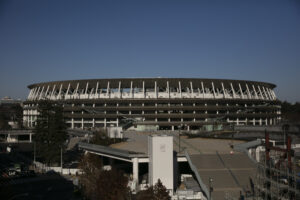
Olympic Stadium
Opening and closing ceremonies, athletics, soccer
Sponsored Content
Used for the 1964 Olympic Games, the venue was rebuilt and designed by architect Kengo Kuma, including tearing down the original. After the Games are over, the stadium will be used for sporting and cultural events. It features multi-layered eaves built using wood from each of Japan’s 47 prefectures and can expand to over 80,000 with the addition of temporary seating on top of the track for certain events.
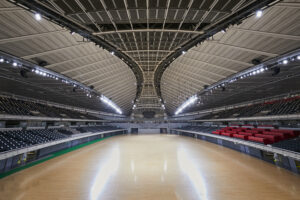
Tokyo Metropolitan Gymnasium
Table tennis
The venue hosted gymnastics and water polo in the indoor pool during 1964.
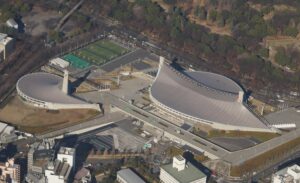
Yoyogi National Stadium
Handball
The host of aquatics and basketball for the 1964 Games, architect Tange Kenzo’s design was seen as an marvel with its suspension roof design and holds up as one of the city’s most beloved pieces of architecture.
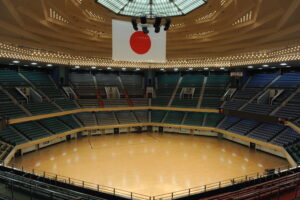
Nippon Budokan
Judo, karate
This legacy venue was built for the 1964 Games to host judo and has established itself as a martial arts mecca and concert venue since then. In 1970, it hosted the first-ever World Karate Championships. The Beatles became the first rock band to perform at the Budokan in 1966.
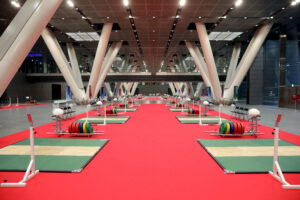
Tokyo International Forum
Weightlifting
A multi-purpose exhibition center comprised of eight main halls of various sizes, exhibition spaces and other facilities featuring curves of steel truss and glass with the outside shaped like an elongated boat.
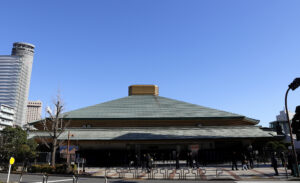
Kokugikan Arena
Boxing
A different sport — sumo wrestling — has made this an iconic venue. Sumo is considered the national sport of Japan and the Kokugikan Arena has become its spiritual home.
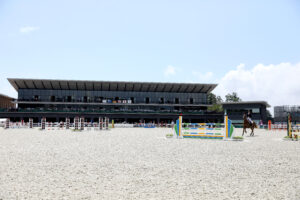
Equestrian Park
Equestrian (Jumping, dressage, eventing)
Another 1964 legacy venue, away from the Games, it is a public park that offers a green escape from the streets of Tokyo.
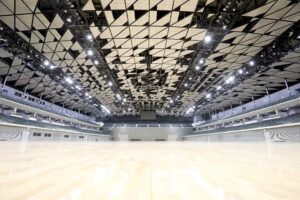
Musashino Forest Sport Plaza
Badminton, modern pentathlon (fencing)
Situated close to the Tokyo Stadium, the plaza will serve as a multi-purpose sports venue. It is composed of the main arena building and the sub-arena building.
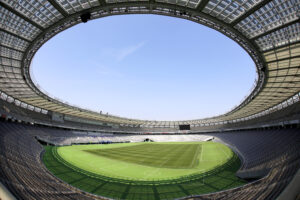
Tokyo Stadium
Soccer, rugby, modern pentathlon (swimming, fencing, riding, Laser-run)
The leading venue for soccer matches, the multi-purpose venue will be used for a variety of activities and normally is the home of J1 League football club FC Tokyo.
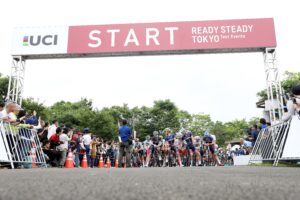
Musashinonomori Park
Road cycling
The start line for the cycling road race, the park is surrounded by the Musashino Forest, offering plentiful greenery and beautiful views.
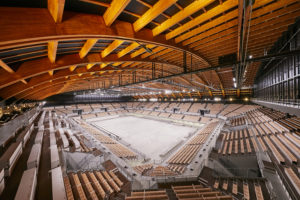
Ariake Arena
Volleyball
A new construction in the northern part of the Ariake district. After the Games it will become a new sporting and cultural center.
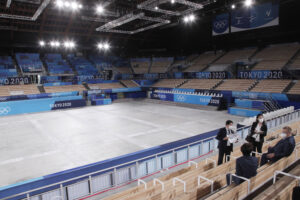
Ariake Gymnastics Centre
Gymnastics (rhythmic, artistic, trampoline)
This 12,000-seat temporary venue in the Tokyo Bay Zone will host gymnastics. The surrounding area used to be a timber storage location, which inspired the wooden architecture of this venue. Even the benches inside are made of wood.
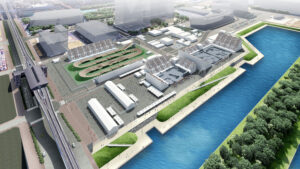
Ariake Urban Sports Park
BMX cycling BMX, freestyle cycling, skateboarding
A temporary venue located along the waterfront and within the Tokyo Bay Zone, this will be the site of several new Olympic events.
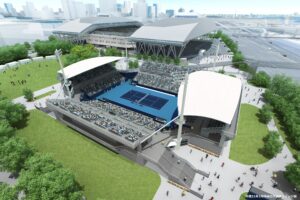
Ariake Tennis Park
Tennis
One of the main tennis facilities in the country, featuring the Ariake Coliseum centre court and fully equipped with show courts, indoor courts and outdoor courts.
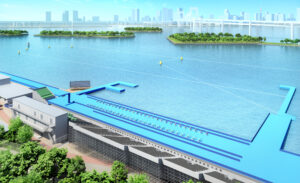
Odaiba Marine Park
Marathon swimming, triathlon
Located on a man-made island with great views of Rainbow Bridge, Tokyo’s cityscape and the ocean, the park will host a temporary venue.
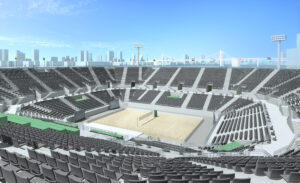
Shiokaze Park
Beach volleyball
Another venue to offer views of Rainbow Bridge and the Tokyo Bay, Shiokaze Park is the largest park on the Tokyo waterfront area of Odaiba. A temporary venue will be set up in the park.
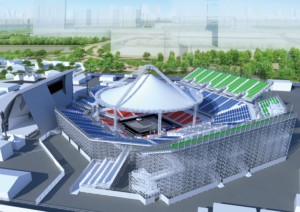
Aomi Urban Sports Park
3×3 basketball, sport climbing
Situated on the waterfront Aomi district and with views across Tokyo Bay, this is another temporary venue.
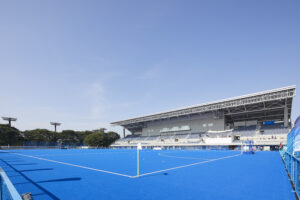
Oi Hockey Stadium
Field Hockey
Located inside the Oi Central Seaside Park Sports Forest, the stadium is a permanent addition to the city, having been completed in June 2019.
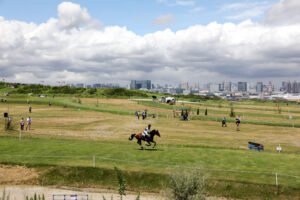
Sea Forest Cross-Country Course
Eventing (cross-country)
A temporary cross-country course has been constructed on an area of reclaimed land, offering views of Tokyo Bay and the cityscape.
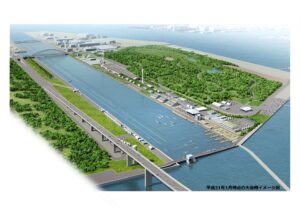
Sea Forest Waterway
Canoe sprint, rowing
The waterfront site will be used for international rowing and canoe competitions post Games, with the aim of becoming a premier location in Asia for water sports.
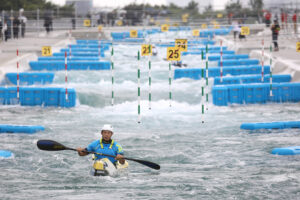
Kasai Canoe Slalom Centre
Canoe slalom
Built on the land adjoining the Kasai Rinkai Park and completed in May 2019, the center houses the first man-made course in Japan which is 200 meters in length and has a height differential of 4.5m from start to finish. It will remain in use after the Games for watersports and rafting for the general public.
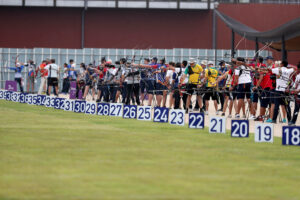
Yumenoshima Park Archery Field
Archery
It is shaped like an archer’s bow and includes a grandstand and a warm-up area apart from the competition field. Constructed on a former landfill site, it is located in the Tokyo Bay Zone and will be used for archery and a wide range of other activities post Games.
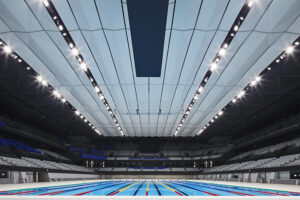
Tokyo Aquatics Centre
Swimming, artistic swimming, diving
The last of eight new venues to be completed in February 2020, it includes the competition pool, a sub-pool for warmups and a diving pool. Located in the Tatsumi-no-Mori Seaside Park, water temperature is maintained by an environmentally friendly geothermal heating device. Thanks to movable walls and floors, length and depth can be adjusted in both the main pool and the warm-up pool.
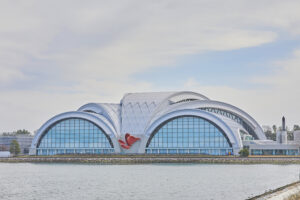
Tatsumi Water Polo Centre
Water polo
This venue was designed in 1990 to serve as the main facility for water sports in the Tokyo area.
Sapporo Odori Park
Athletics (marathon, race walking)
The events will take place in Sapporo because of fears over extreme heat. Located in the center of Sapporo City, the Sapporo TV Tower, Sapporo Station and the Sapporo Campus of Hokkaido University are among the landmarks which will be passed along the planned course.
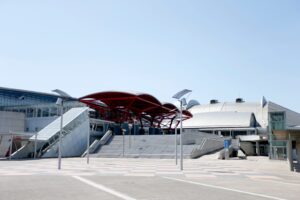
Makuhari Messe Hall
Wrestling, taekwondo, fencing
Located on the east of the Tokyo Bay Zone, this large-scale convention center consists of three major zones — the International Exhibition Hall, the International Conference Hall, and the Makuhari Event Hall.
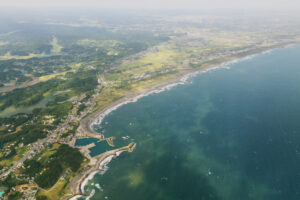
Tsurigasaki Surfing Beach
Surfing
Located about 40 miles east of Tokyo in the town of Ichinomiya, the location has been chosen for its consistency in surf conditions and could offer the Games’ most scenic moments.
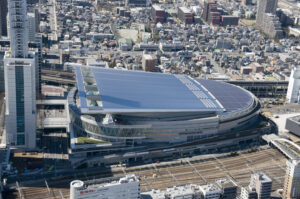
Saitama Super Arena
Basketball
Located in Saitama City, the arena opened in 2000 and is one of Japan’s largest multipurpose venues, hosting sporting competitions, concerts, conferences and other events.
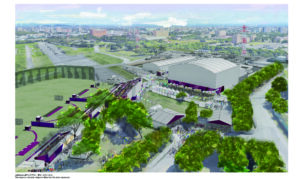
Asaka Shooting Range
Shooting
After hosting the shooting competitions at the Tokyo 1964 Games, the venue normally serves as the base for Japan’s Military Parade and the Japan Ground Self-Defense Force and is also the headquarters of the Eastern Army.
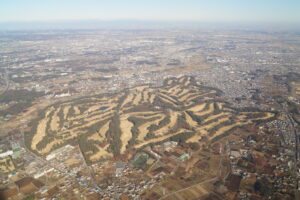
Kasumigaseki Country Club
Golf
Extending out across the verdant Musashino Hills and located in Kawagoe City, the par-71 course is one of Japan’s oldest and most respected golf clubs.
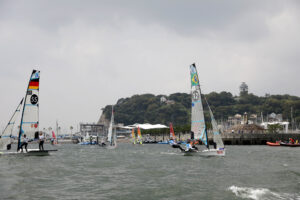
Enoshima Yacht Harbor
Sailing
Located in Fujisawa City, the harbor was constructed for use at the 1964 Games and is Japan’s first ever harbor capable of hosting water sport competitions.
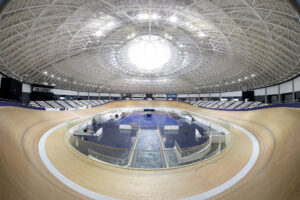
Izu Velodrome
Track cycling
Located in Izu City, Shizuoka Prefecture, it houses a 250-meter wooden cycling track that fully complies with the technical standards required by the UCI, the world governing body for cycling. The velodrome underwent significant renovations.
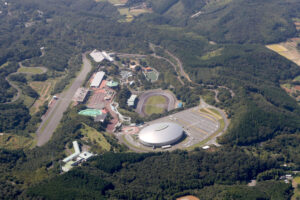
Izu MTB Course
Mountain biking
Located in Izu City, Shizuoka Prefecture, the off-road course measures 4,100 meters in length and was built in 2010 with views of Mount Fuji as well as features designed for beginner and advanced cyclists.
Fuji International Speedway
Road cycling (road race finish, time trial)
Racing will finish with riders completing circuits in and around the Fuji Speedway, a motorsport track located below Mount Fuji.
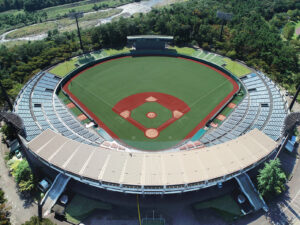
Fukushima Azuma Baseball Stadium
Baseball/softball
A total of seven games across the baseball and softball competitions will be played at this stadium in Fukushima, which is important for two reasons. First of all, the softball opener between Japan and Australia on July 21 will be the first event of these Olympics. But also, that game will hold symbolic importance for Japan because it represents a major step in the recovery of a region that was devastated by an earthquake, tsunami and nuclear disaster in 2011.
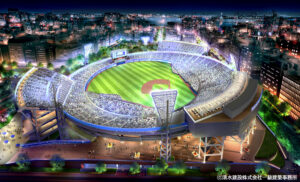
Yokohama Baseball Stadium
Baseball/softball
Located about 24 miles from Tokyo, this 35,000-seat stadium is the home of the Yokohoma DeNA BayStars of the Nippon Professional Baseball league. All Olympic baseball games, except for the opening game, will be played here. This stadium will also be the site of 11 softball games, including the gold and bronze medal games.
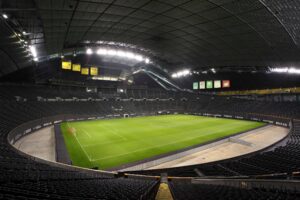
Sapporo Dome
Soccer
All-weather dome-shaped stadium is located in Sapporo City in Japan’s island of Hokkaido. Primarily used for baseball and soccer outside of Games time and was used during the 2002 FIFA World Cup and 2019 Rugby World Cup.
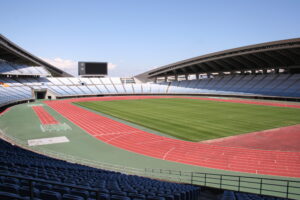
Miyagi Stadium
Soccer
The site is located in the city of Rifu in the Miyagi prefecture and is mainly used for athletics competitions and soccer. The roof that covers the seated spectators of the stadium was designed to evoke the images of a crescend moon orned by the helmet of Date Masamune, a 16th century feudal lord who reigned over an area that includes the current Miyagi prefecture.
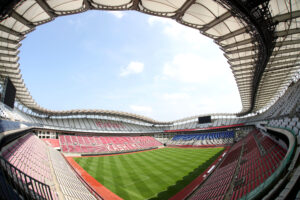
Ibaraki Kashima Stadium
Soccer
Located in Kashima City, the Ibaraki Kashima Stadium is a dedicated soccer stadium with a natural grass pitch and excellent views from all seats for fans of Kashima Antlers.
Saitama Stadium
Soccer
The largest dedicated soccer stadium in Japan and one of the largest in Asia, it was built for the 2002 FIFA World Cup.
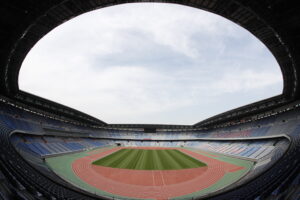
International Stadium Yokohama
Soccer
Located in Yokohama City, , this multi-purpose stadium boasts a seating capacity for 72,327 spectators, the largest of any in Japan. Around an hour away from central Tokyo, it is home to the J League’s Yokohama F Marinos. Another to host games at the 2002 FIFA World Cup and 2019 Rugby World Cups.


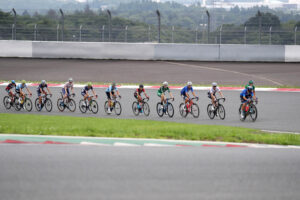
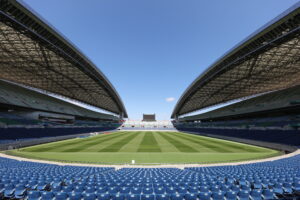










 Copyright © 2025 by Northstar Travel Media LLC. All Rights Reserved. 301 Route 17 N, Suite 1150, Rutherford, NJ 07070 USA | Telephone: (201) 902-2000
Copyright © 2025 by Northstar Travel Media LLC. All Rights Reserved. 301 Route 17 N, Suite 1150, Rutherford, NJ 07070 USA | Telephone: (201) 902-2000